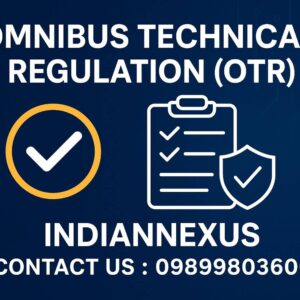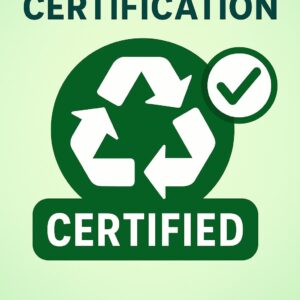In India, ensuring product quality and safety is not just a responsibility but a legal requirement in many sectors. One of the most recognized symbols of quality assurance is the ISI Mark, issued by the Bureau of Indian Standards (BIS). Products bearing the ISI mark are trusted by consumers and meet the standards set under BIS Certification. This blog explains everything you need to know about ISI Certification and Registration, including its process, benefits, and how to obtain it for your products.
What is ISI Certification?
ISI Certification is a quality certification provided by the Bureau of Indian Standards (BIS) to ensure that a product meets the required Indian standards for safety, performance, and reliability. The ISI mark (short for Indian Standards Institute mark) is mandatory for several products such as electrical appliances, cement, steel, and household goods.
When a product bears the ISI mark, it indicates that it has been tested and verified as per BIS regulations and complies with the Indian Standard (IS) applicable to that product. Manufacturers who want to sell regulated products in India must obtain ISI Certification from BIS before launching them in the market.
Importance of ISI Certification in India
Obtaining ISI certification is crucial for both manufacturers and consumers. Here’s why it matters:
- Consumer Safety: It ensures that the product is safe for use and meets the safety parameters defined by BIS.
- Quality Assurance: The ISI mark indicates that the product has passed strict quality and performance tests.
- Market Acceptance: Products with ISI certification are more trusted by consumers, retailers, and government bodies.
- Legal Compliance: For many products, BIS ISI registration is mandatory under Indian law. Selling such products without ISI certification can result in penalties or a ban.
- Export Advantage: Indian products with BIS ISI certification are recognized globally, making it easier for manufacturers to export.
Products Covered Under Mandatory ISI Certification
BIS has made ISI certification mandatory for various products across sectors. Some of the key categories include:
- Electrical appliances – switches, cables, geysers, fans, irons, etc.
- Cement and steel products
- Automotive tyres and tubes
- Pressure cookers and LPG cylinders
- Packaged drinking water and plastic products
- Electrical motors, transformers, and other industrial equipment
The list of products is regularly updated by BIS. Manufacturers should check the latest BIS notification to confirm whether their product falls under the mandatory certification list.
ISI Certification Process in India
The ISI registration process involves several steps, from documentation to factory inspection. Here’s a detailed breakdown of the BIS ISI certification process:
1. Product Identification
Identify the applicable Indian Standard (IS code) for your product. Each product has a specific IS number that defines its testing and compliance requirements.
2. Application Submission
Submit an application to BIS through the Manakonline BIS portal along with all necessary documents, such as factory license, test reports, quality management details, and manufacturing process flow.
3. Product Testing
The product samples must be sent to a BIS-recognized laboratory for testing. The lab conducts tests according to the relevant IS standard and provides a test report.
4. Factory Inspection
BIS officers conduct a factory audit to verify manufacturing capability, quality control systems, and conformity with the standard.
5. Evaluation of Test Report
Once the test reports and inspection reports are satisfactory, BIS evaluates all documents.
6. Grant of License
If all requirements are met, BIS grants the manufacturer an ISI license, allowing them to use the ISI mark on their products.
Documents Required for ISI Certification
To apply for ISI registration online, manufacturers must prepare the following documents:
- Company registration certificate and manufacturing license
- Product test report from a BIS-approved lab
- Factory layout and process flow chart
- Details of raw materials and machinery
- Quality control plan and calibration reports
- Authorized signatory and declaration forms
Accurate documentation ensures faster approval and avoids delays in the certification process.
Validity and Renewal of ISI Certification
The BIS ISI license is generally valid for two years, after which it must be renewed. Renewal involves submitting updated test reports and ensuring continued compliance with BIS standards. Timely renewal prevents interruption in product manufacturing or sales.
Benefits of Obtaining ISI Certification
- Enhanced Brand Reputation – The ISI mark increases brand credibility and consumer confidence.
- Market Access – It allows manufacturers to sell products in the Indian market legally.
- Consumer Trust – Products with ISI certification are perceived as safer and more reliable.
- Competitive Advantage – BIS-certified manufacturers gain an edge over uncertified competitors.
- Export Readiness – ISI-certified products often meet international safety and quality benchmarks.
Role of ISI Certification Consultants
The ISI certification process can be complex, especially for new manufacturers. Hiring a professional ISI Consultant in India helps streamline the process. A consultant assists with:
- Identifying the correct IS standard
- Preparing documentation and application
- Coordinating with BIS and testing laboratories
- Handling factory inspection and compliance audits
- Ensuring faster approval of BIS ISI registration
Consultants like Indiannexus provide complete support for ISI registration, BIS certification, WPC approval, and other compliance requirements at affordable costs.
Conclusion
The ISI Certification and Registration process plays a vital role in maintaining product quality, safety, and consumer trust in India. For manufacturers, obtaining an ISI mark not only fulfills legal obligations but also enhances their product’s credibility in the market.
If you are planning to get your product ISI certified, it’s advisable to consult experts who can guide you through every step of the process—from documentation to final approval.








